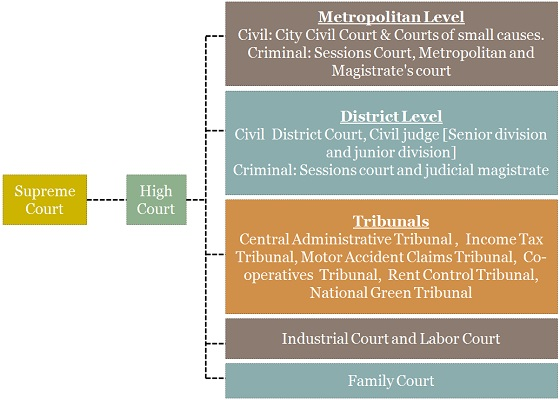Indian Polity
Sorry State of Tribunals
- 07 Aug 2021
- 4 min read
Why in News
Recently, the Supreme Court (SC) expressed displeasure against the Central government by asking whether it intends to “close” tribunals across the country by not filling up vacancies that have been pending for years.
Key Points
- About Tribunals:
- Tribunal is a quasi-judicial institution that is set up to deal with problems such as resolving administrative or tax-related disputes.
- It performs a number of functions like adjudicating disputes, determining rights between contesting parties, making an administrative decision, reviewing an existing administrative decision and so forth.
- Tribunals were not part of the original constitution, it was incorporated in the Indian Constitution by 42nd Amendment Act, 1976.
- Article 323-A deals with Administrative Tribunals.
- Article 323-B deals with tribunals for other matters.
- The Tribunals were set up to reduce the workload of courts, to expedite decisions and to provide a forum which would be manned by lawyers and experts in the areas falling under the jurisdiction of the Tribunal.
- Issues Concerning Tribunals:
- Persisting Vacancies: The SC noted that, the vacancies of 20 presiding officers, 110 judicial members and 111 technical members were pending across the country in various tribunals.
- For example, in the National Green Tribunal, Income Tax Appellate Tribunal, Central Administrative Tribunal.
- These persisting vacancies make them redundant.
- Ignoring Recommendations: Recommendations of names by the selection committees led by sitting Supreme Court judges to fill up the vacancies have been largely ignored by the government.
- Denying Right of the People to Access Justice: The Court pointed out that with tribunals defunct and High Courts having no jurisdiction over the areas of law wielded by tribunals, litigants have nowhere to go for justice.
- Problem of Non-Uniformity: Added to this is the problem of non-uniformity across tribunals with respect to service conditions, tenure of members, varying nodal ministries in charge of different tribunals.
- These factors contribute significantly to malfunctioning in the managing and administration of tribunals.
- Persisting Vacancies: The SC noted that, the vacancies of 20 presiding officers, 110 judicial members and 111 technical members were pending across the country in various tribunals.
- Related Development:
- The Tribunals Reforms (Rationalisation and Conditions of Service) Bill, 2021 has been introduced in Lok Sabha.
- The Bill dissolves certain existing appellate bodies and transfers their functions to other existing judicial bodies.
- The term of office for the Chairperson and members of a Tribunals will be four years, subject to an upper age limit of seventy years for the Chairperson, and sixty-seven years for other members.
- The Bill specifies that a person should be at least 50 years of age to be eligible for appointment as a Chairperson or member.
Way Forward
- Reforming the tribunals system in India may as well be one of the keys to remedy the age-old problem that still cripples the Indian judicial system – the problem of judicial delay and backlog.
- To regulate the matters of tribunals without compromising their independence is the establishment of the National Tribunals Commission (NTC).





